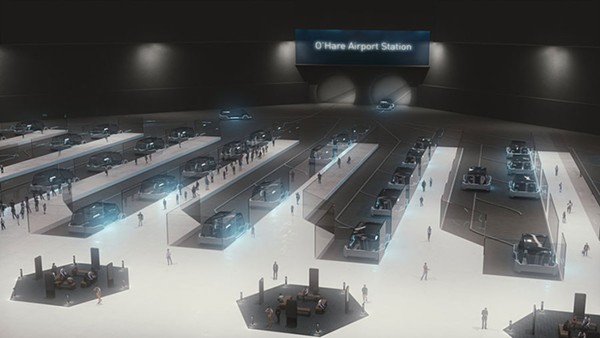After publication of the my latest article about the O'Hare Express, I heard from two other journalists who recently covered the project who said they had had no luck getting new comments from the Chicago Infrastructure Trust about Elon Musk's scheme. Trust spokesperson Jennifer Martinez, who worked out of Mayor Rahm Emanuel's office, responded to several of my questions by email on Wednesday, February 21.
This afternoon a Mayor's Office staffer confirmed that Martinez left the job on February 23 to take a position at a nonprofit organization. Since it appears that Martinez was unusually forthcoming in the remarks she sent before leaving he job, I've decided to publish our full exchange below.
The city has repeatedly stated that the O’Hare Express project poses no risk that taxpayers would be on the hook for expenses. However, is there any danger of there being a need to use public money in the event that the tunneling has an impact on utility lines, buildings, or the water table; or if the tunnel is left unfinished; or if the service proves unprofitable and the Boring Company decides to stop running it?
No. Any costs or liabilities incurred as a result of the construction will be borne by The Boring Company. The contract will include appropriate financial and performance assurances that the city will be well-protected should any such instances occur. If construction is completed and a default occurs during operations, the city would be handed over a completed project with no obligations or liabilities relating to the capital costs. The city would have no obligation to continue operations if the economics of the project do not support the operational costs; however, it is likely that in the absence of any public capital costs and outstanding debt, the project will be of beneficial use and revenue positive (whether as an express service or as some other tunnel-based asset).
Groups like the Active Transportation Alliance have questioned whether the project represents a wise use of city staff time and attention, when Chicago has so many other, arguably more pressing, transportation needs. What’s CIT’s response to this argument?
The city does have many transportation priorities and improving access between the economic engines of Chicago – O’Hare Airport and the Loop – has been one of those priorities for decades.
We would also note that this project offers environmental benefits. It would offer travelers a sustainable, environmentally-friendly transportation option, as opposed to high-emission, congestion causing automobiles. Improving access to green transportation options is also part of the city’s long-term transportation priorities.
Our modeling shows that with O'Hare modernization, there would be increased demand for both the CTA Blue Line and the OEX. Therefore it makes complete sense, based on our transportation priorities and growing economy that staff would work with The Boring Company to deliver this innovation transportation option with all costs and/or liabilities being borne by The Boring Company.
Elon Musk has claimed he can build the O’Hare Express for $1B, which would be far cheaper than using conventional tunneling methods, but his demonstration tunnel in the LA area was dug using a used excavating machine from Oakland, it didn’t include passenger escape options, and it didn’t feature the “electric skate” technology or the advertised transit pods. How confident is CIT that Musk can deliver on his promise to create the O’Hare Express using tech that doesn’t seem to currently exist, at a low price, within in a relatively short time period?
On the technology side – although the specific vehicles have not been finalized, there are automated people movers in airports all over the world that employ similar principles and technology. This is more advanced but the same principles. And the tunnel is a tunnel. The Boring Company is refining more efficient approaches to tunneling, which makes the economics of this project work.
The city has made clear we wanted a team partner that would deliver service to O’Hare in 20 minutes or less, at a price comparable to a taxi or rideshare. The Boring Company plans to deliver that express service at half that cost. And, the Boring Company is willing to build a transformational civic amenity with its own money because it is taking the risk that ridership fares and other revenues will cover the cost – not taxpayer dollars.
Most of the mayoral candidates who’ve commented on the O’Hare Express have indicated that they would cancel the project if a contract has not already been signed with the Boring Company by the time they take office. How likely is it that the contract will be finalized before the next mayor would have a chance to intervene?
Our goal is to present the City Council with a proposed contract that protects taxpayers and requires no taxpayer funding, while providing a transformational public amenity that will make Chicago more competitive on the world stage and deliver economic benefits for generations to come.
How much time would residents and aldermen have to review the contract before it comes to a vote in City Council?
We think a contract of this importance should have adequate time for review and discussion before a vote is taken.




